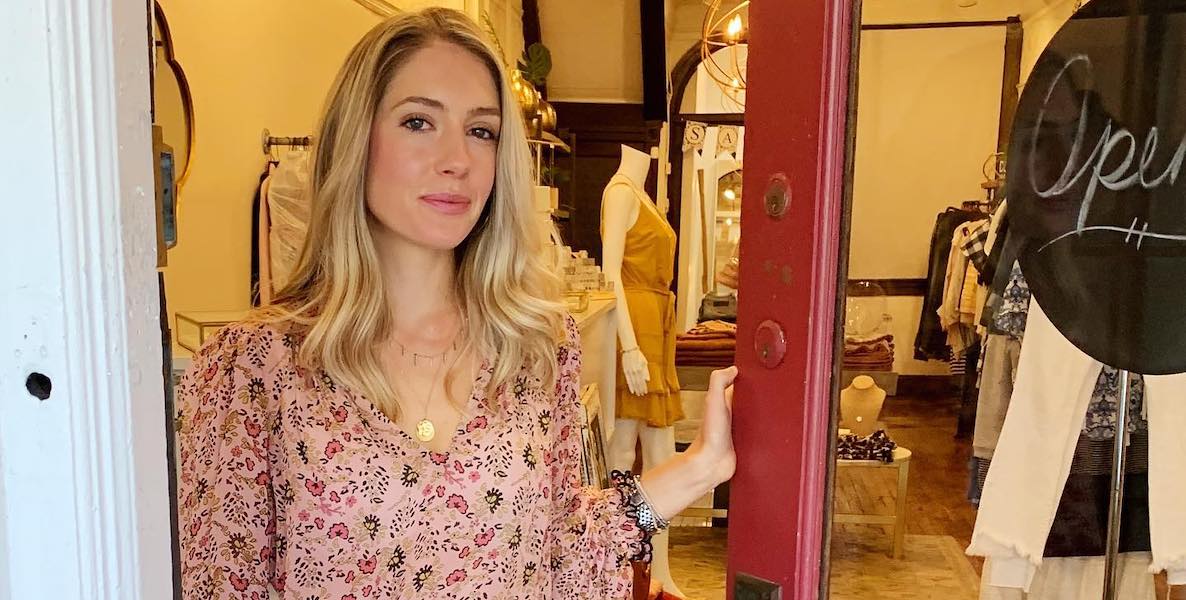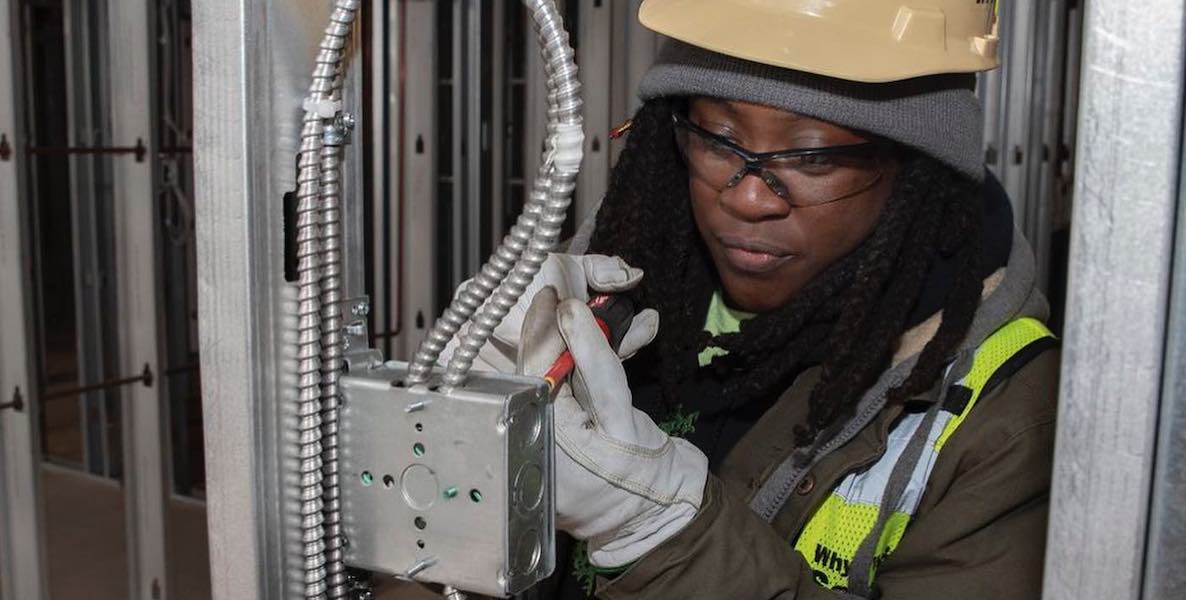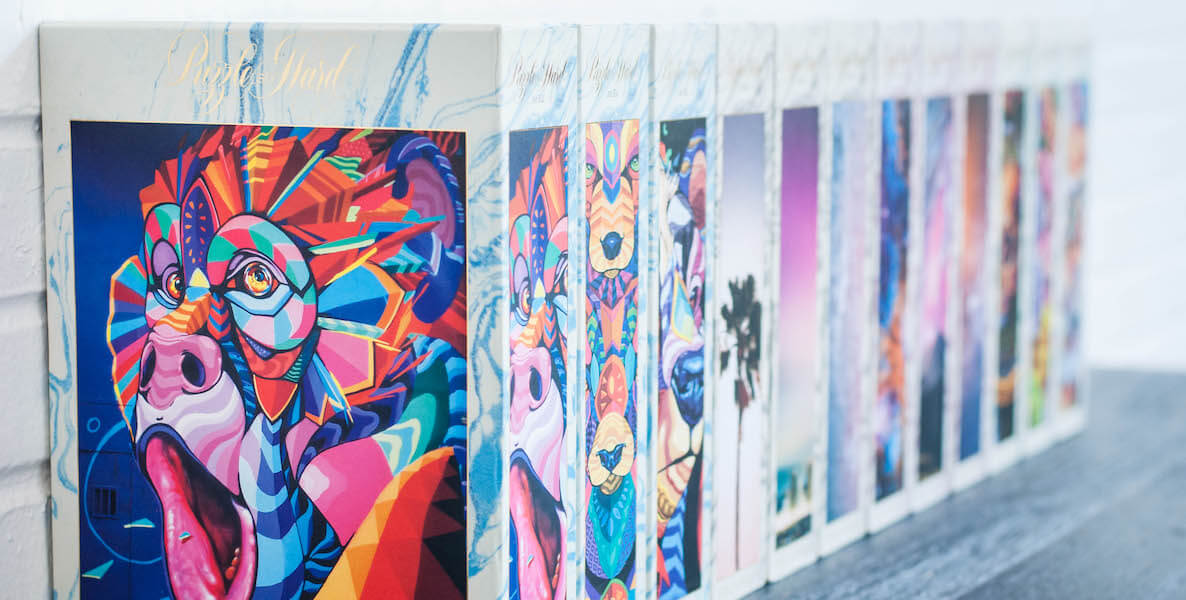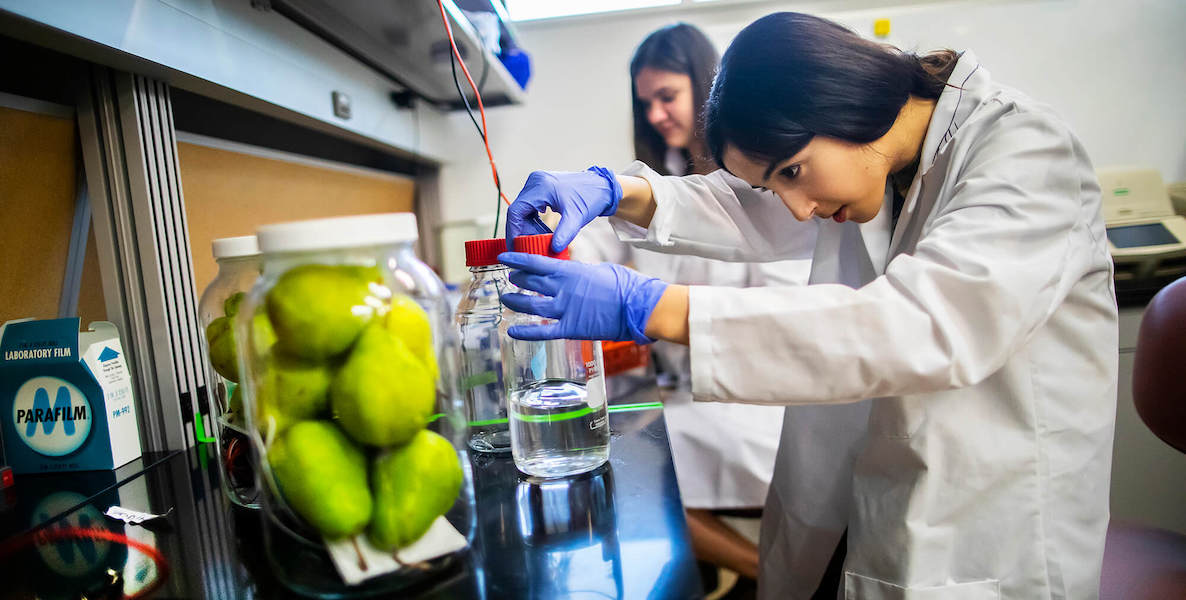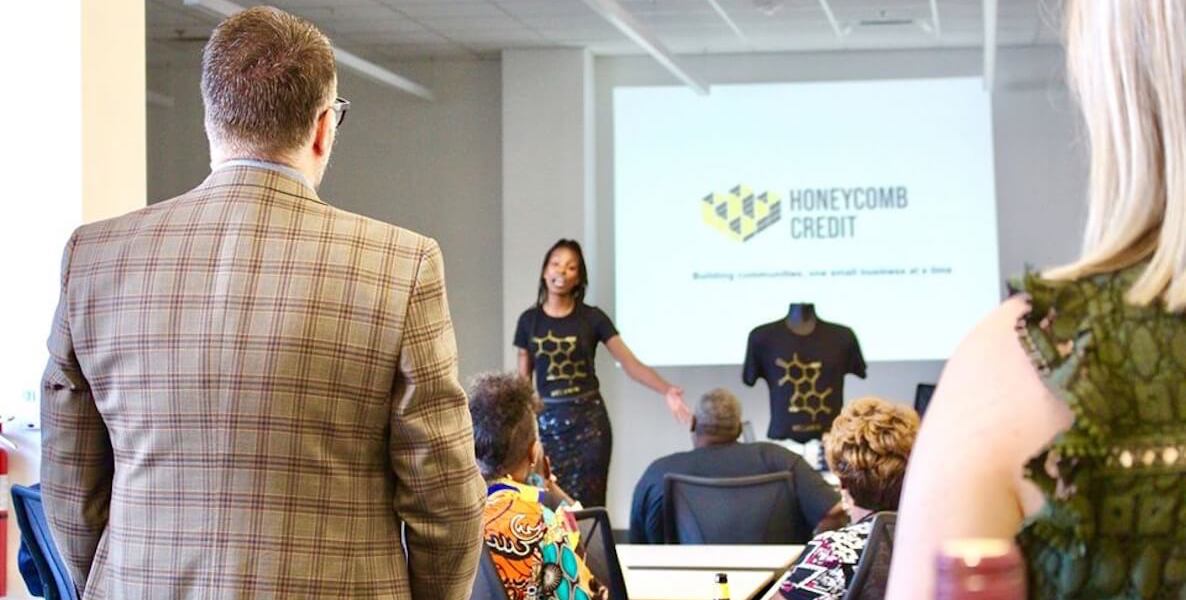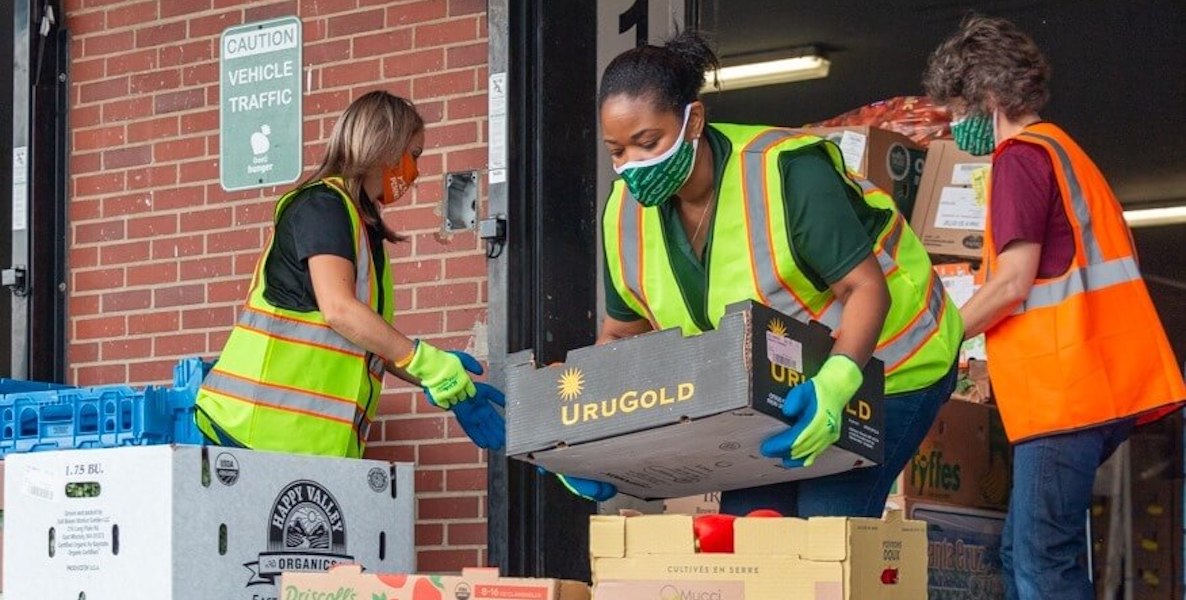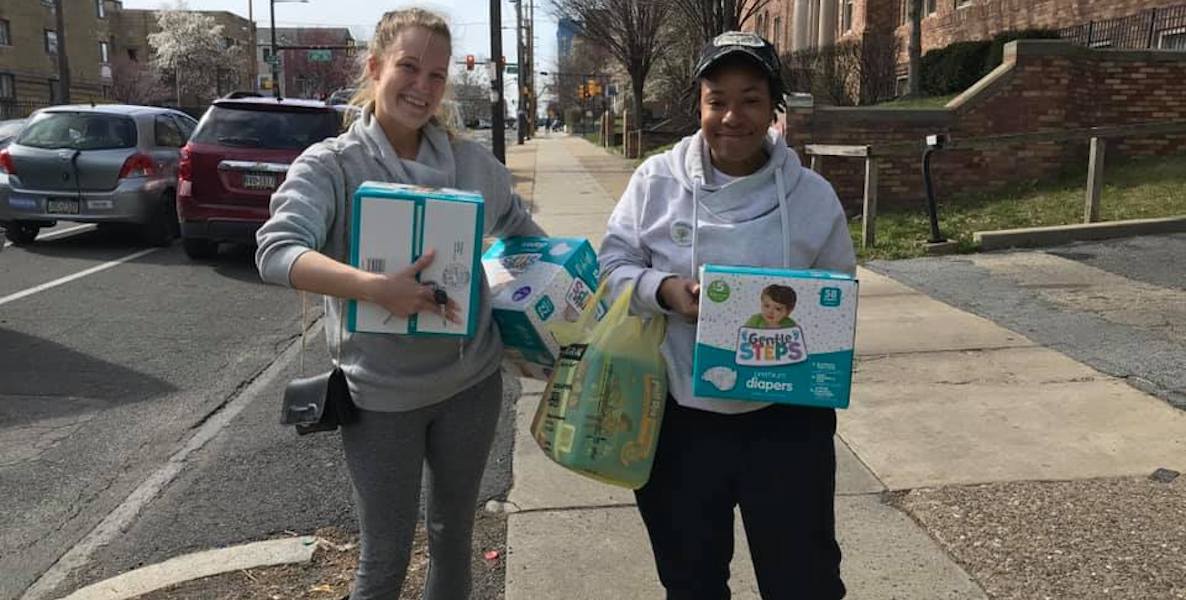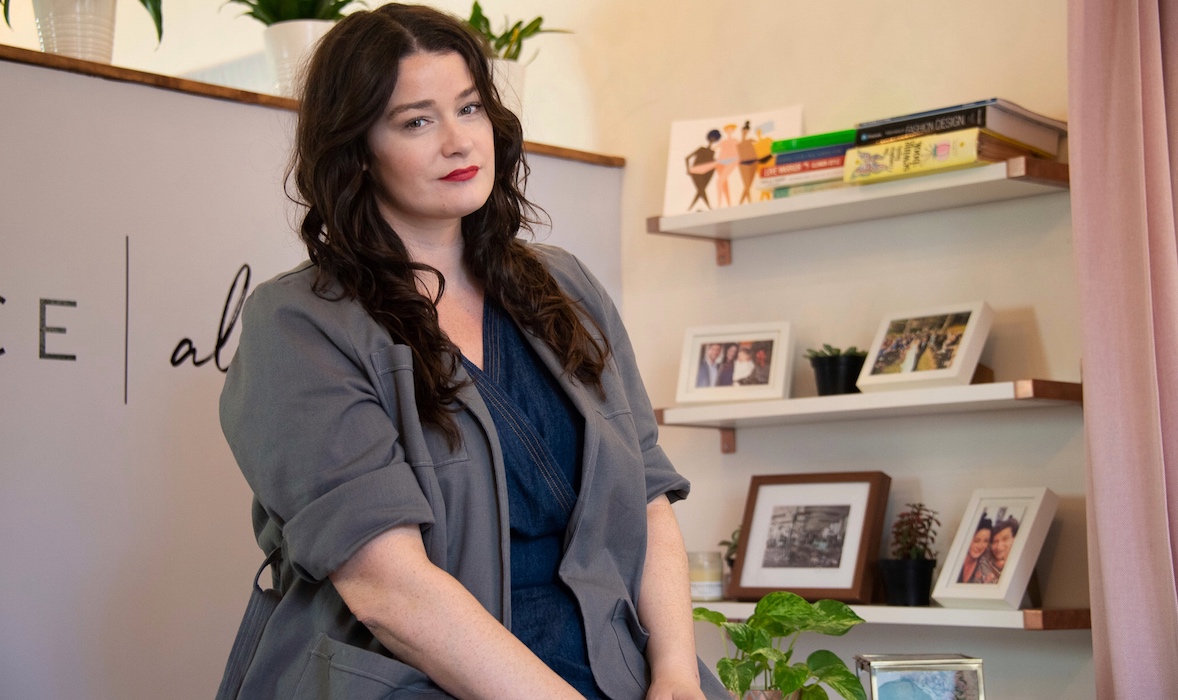Growing up in Havertown, Mary Alice Duff was always fashionable. The daughter of a longshoreman and an administrative assistant and the youngest of five kids, she had a natural instinct for making the most of her wardrobe, which consisted of hand-me-downs and whatever she could score from fast-fashion retailers like Old Navy or H&M.
“I’ve always known how to put together an outfit, but I didn’t know anything about the fashion industry,” she says. “I grew up blue-collar: I didn’t know being a fashion designer was even a real job.” But she did know how to sew, thanks to her stylish, beloved grandmother in Bridesburg, who taught Duff how to operate a machine when she was about seven years old.
It’s that skill that ultimately changed Duff’s life.
“I was leading board meetings and was required to look a certain way, and being a size 18, I couldn’t find nice clothes,” Duff says. “It seemed ridiculous to me that a woman with money to spend who was looking for something that was high-quality and polished couldn’t find a basic, 100 percent wool skirt that was lined.”
With two masters degrees from Bryn Mawr College—one in social work, and the other in law and social policy—Duff spent 10 years climbing the ranks in the nonprofit sector. “I was leading board meetings and was required to look a certain way, and being a size 18, I couldn’t find nice clothes,” Duff says. “It seemed ridiculous to me that a woman with money to spend who was looking for something that was high-quality and polished couldn’t find a basic, 100-percent-wool skirt that was lined.”
So she started sewing to solve her own problem.
It wasn’t just the compliments she received that made her feel good, but the knowledge that she was opting out of the damaging fast-fashion system, and knew exactly where all of her clothes and their materials came from.
“Through my research as I made my own clothes, I realized just how horrific the![]() conditions are for garment workers around the world, who are mostly women, and just how much destruction we’re doing to our planet through the production of artificial fibers like polyester, which are the majority of our apparel,” she says.
conditions are for garment workers around the world, who are mostly women, and just how much destruction we’re doing to our planet through the production of artificial fibers like polyester, which are the majority of our apparel,” she says.
Gradually, she kicked her fast-fashion habit, and replaced all of the items in her wardrobe with things she created.
Given her gift for making clothes and her insight into the plus-size experience, it seemed like a no-brainer for her to start her own business. “I have big breasts, I have big hips, big thighs, big arms—I understand what needs to happen with clothes for them to fit us better,” she says.
So, while working full-time, Duff went back to school at Made Institute, and learned everything she possibly could about the fashion industry. She saved up about $10,000 and, in 2017, she quit her day job and launched Alice Alexander, named for her five-year-old daughter and her husband, a public school teacher.
But things were not all puppies and rainbows.
“When I say it was a fucking disaster, that could not be more understated,” she says. From September 2017 until the end of that year, she sold just six pieces; by January, she was completely broke. “I didn’t have two nickels to rub together.”
She realized she needed help, and posted an ad on Craigslist for a sewer, so that she could free up more time to focus on the e-commerce aspect of the business. That’s how she found Abby Stenner, who became her motivation.
“I said ‘Here’s the deal, Abby: We have to sell enough clothes for me to be able to pay you in two weeks.’ And that’s what I did,” Duff recalls. “I calculated her salary plus how much I would need to pay for fabric, and that’s how much we needed to sell.”
Far from being turned off, Stenner has been with Duff ever since. “She is the most loyal, most phenomenal human being,” Duff says.
Alice Alexander is now profitable and employs two full-time sewers, with plans to hire more after the epidemic passes, but Duff is adamant that entrepreneurship is no walk in the park. “There’s a fairytale around entrepreneurship, but it’s agonizing,” she says. “Entrepreneurs are working their asses off, and when customers know that, they value the work more and are willing to pay them what they’re worth.”
Adrienne Rey can relate. She’s the owner of Curve Conscious, the only other store where Duff shops. (Duff says Curve Conscious serves “a vital, vital need” in our city.) It’s a high-fashion resale store for plus-size women, and a much-needed complement to the work Duff does.
Duff’s business mission has remained two-fold: In addition to solving the wardrobe challenge that so many women experience, she is committed to creating entry-level, blue-collar jobs for low-income Philadelphians.
“Mary Alice is just so smart,” Rey says one morning from home; her store is closed, though she’s selling online through Facebook and Instagram. “She just has this real passion for the industry and a commitment to educating others about what the fashion industry does to our environment, pocketbooks and self-esteem—especially for the plus-size segment. She stands out not only because she’s super-passionate, but because she’s super transparent.”
![]() Since its inception, Duff’s business mission has remained two-fold: In addition to solving the wardrobe challenge that so many women experience, she is committed to creating entry-level, blue-collar jobs for low-income Philadelphians. All employees start at $15 per hour, and steadily increase from there. And the company only sources materials that are biodegradable and not harmful to the earth.
Since its inception, Duff’s business mission has remained two-fold: In addition to solving the wardrobe challenge that so many women experience, she is committed to creating entry-level, blue-collar jobs for low-income Philadelphians. All employees start at $15 per hour, and steadily increase from there. And the company only sources materials that are biodegradable and not harmful to the earth.
“That dictates everything that we do. It dictates how we hire and how we design,” she says. She can’t design a product that will take 10 hours to make, because the price point will simply be too high; prices currently range from $74 for a short-sleeve shirt, to $315 for a jacket or jumpsuit. All designs have to come in under five hours. And all materials must be zero- or low-waste.
And, naturally, all pieces have to be gorgeous. Duff’s says her aesthetic is one of strength, with ’70s and ’40s influences. “I want you to feel like this can be armor for you, but still feel as much of a feminine vibe as you want,” she says.
Many of her pieces are adjustable, with ties or elastic, so that the wearer can decide how they want to present their body. “At the end of the day, I just want women and nonbinary folks to put our clothes on and feel like they can go out and kick ass.”
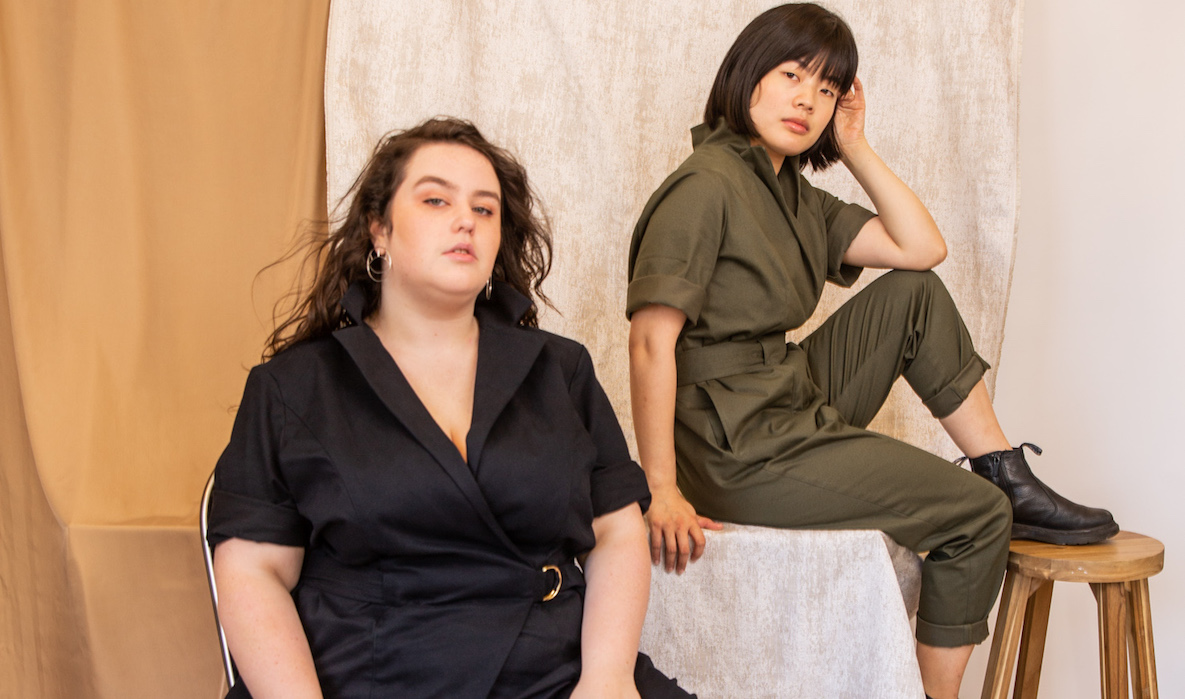
She’s thankful for the support of local community development financial institutions (CDFIs) like Entrepreneur Works, Judy Wicks’ Circle of Aunts and Uncles through The Enterprise Center, and Women’s Opportunities Resource Center (WORC). And she’s looking for additional investment that would allow her to scale up, while staying true to her mission.
Duff has no interest in equity investment, and is skeptical of brands that accept venture capital and still call themselves sustainable; she believes VC infusion forces companies to grow at a rate that encourages consumption and an output cycle that’s not sustainable.
“I own 100 percent of my company, and my goal is to scale it to a certain point, and then sell it to my employees,” she says.
Her employees have also rallied to help with the face mask shortage in ![]() Philadelphia during Covid-19. Guided by the local Facebook group Sew Face Masks Philadelphia, Duff and her team will have—separately, safely, hygienically—produced 1,000 masks by next week, thanks to the support of their customers, who have steadily made donations of $5 to $500 to the cause.
Philadelphia during Covid-19. Guided by the local Facebook group Sew Face Masks Philadelphia, Duff and her team will have—separately, safely, hygienically—produced 1,000 masks by next week, thanks to the support of their customers, who have steadily made donations of $5 to $500 to the cause.
“People are chipping in left and right, and I think it speaks to folks feeling like they need to do something,” she says. To avoid waste, they’re only producing what people ask for; right now, they’re specifically supplying organizations that serve the homeless, those challenged with drug addiction, and disabled and immunocompromised adults.
Rey, of Curve Conscious, is particularly inspired by the work Duff does to improve Philly, and the fashion scene here.
“We’re not known for being a fashion town, and there are tons of reasons why, but Mary Alice gives Philly a different edge. It’s awesome that she’s from here, she’s staying here, and she pushes the city to do better for garment workers and the fashion industry,” she says. “It’s a good look for the city that she’s here.”
It’s a “look” that Duff’s ever-fashionable grandmother, Anna Katherine Linwood, who passed away just last month at age 94, would have no doubt approved of, too.
Mary Alice Duff, founder of Alice Alexander. Photo by Adam Barnard


